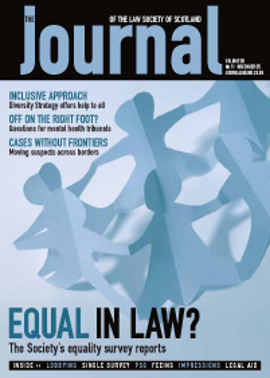Matter for debate

Diligence on the dependence
In Gillespie v Toondale plc 2005 GWD 31-590 an inhibition on the dependence was recalled by Lord Johnston. Whilst the defenders’ financial position might constitute a security risk, as the pursuer could produce no evidence in support of the oral agreement which was the basis of the action, no prima facie case to warrant the diligence on the dependence had been put forward. Accordingly the use of the inhibition was disproportionate and oppressive.
Pleas in law
As everyone knows, the pleas in law are the propositions in law upon which the action or defence thereto is based. They should be able to convey an impression of the legal point in the litigation without the need to consult the averments. In Nimmo v Bank of Scotland 2005 GWD 28-518, an action for damages based on the negligence of a bank in allowing the wrong company to be credited with a cheque made payable to the company to whom the pursuer had been appointed receiver, the pursuer’s plea in law was to the effect that he was entitled to repayment of the sum in the circumstances. Sheriff Evans decided that this plea in law, though widely expressed, was sufficient to cover a case based on negligence although it would have been better to focus the issue of negligence in the plea in law. Sheriff Evans found support for his views in Style Financial Services Ltd v Bank of Scotland 1996 SLT 421.
Debate or PBA
In IST Marine Ltd v Dillon, Greenock Sheriff Court, 16 September 2005 an appeal was taken against the allowance of a proof before answer. In allowing the appeal, Sheriff Principal Kerr considered that there was an issue which if explored at debate, might result in the dismissal of the action. He did observe that whilst the result of the debate might still be the allowance of a proof before answer, it was not incumbent on a party seeking a debate to establish that it was crystal clear, or at least very probable, that the debate would result in dismissal of the action. The fact that allowance of a proof before answer might be the result of a debate did not justify a party being refused a debate. Further if perusal of the pleadings and the rule 22 note made the argument in favour of a debate clear enough, little if anything required to be said further in support of such a motion at the options hearing.
Count, reckoning and payment
In Paterson and Sneddon v Paterson, Edinburgh Sheriff Court, 12 September 2005, after the defender had been ordained to lodge an accounting and had done so, she sought to amend her averments to give her account of the arrangements for holding and intromitting with the funds which were the subject matter of the action. When the defender moved to have the record opened up in terms of the minute of amendment, the pursuers opposed this motion. The sheriff, in ordaining the lodging of an accounting, had decided that there was an obligation to account and accordingly it was no longer open to the defender to challenge the issue of liability to account. The sheriff refused the motion to amend. On appeal to Sheriff Principal Bowen, the sheriff principal decided that as a matter of law and practice the initial procedure in such actions was limited to whether there was an obligation to acccount. Once accounts were ordered and produced, this issue was logically resolved. The only reason for ordering the lodging of accounts was that the obligation to account was conceded or judicially determined. Any issue as to whether certain items properly fell within the liability to account could be dealt with in the objection and answer procedure.
Appeals and notes of evidence
The decision in Graeme Fraser and Co v Donaldson, Inverness Sheriff Court, 8 September 2005 is referred to as an important reminder of a matter which might on occasions be overlooked. The defender appealed the decision following proof, inter alia challenging the sheriff’s determination as to credibility. The defender, representing herself, indicated that she intended to refer to the notes of evidence in reply to a questionnaire sent by the sheriff principal’s secretary. She was then instructed that as the notes had not been extended, she would require to instruct their extension. By the time the appeal was heard the notes had not been lodged. In the course of the appeal, it was observed that because the notes of evidence had not been extended, the sheriff’s findings of fact could not be challenged unless the note appended to the judgment contradicted the findings. The appeal was refused. Without the extended notes of evidence, it was impossible for the findings in fact to be successfully challenged at the appeal. As a further observation, this is another example of a party litigant failing to follow the appropriate practice and as a result suffering the consequences in the litigation. The information given to the defender was clear as to her obligations with regard to the extension of the notes.
Financial claims in family actions In Lindsay v Lindsay 2005 SLT
(Sh Ct) 81 the sheriff, after evidence, granted decree of divorce and ordered that the determination of the capital sum take place within 12 months. Due to delays, although evidence commenced within the 12 month period, the evidence was not concluded within that period. A motion to extend the period was refused at first instance as incompetent. In allowing the appeal, Sheriff Principal McInnes observed that if the court had been able to sit continuously, there would have been no necessity for the motion. He accordingly allowed the appeal as he considered that a sheriff principal had an inherent jurisdiction to do “whatever was necessary to discharge the whole of [the court’s] responsibilities”. This jurisdiction was “a residual source of powers, which the court may draw upon as necessary whenever it is just or equitable to do so, in particular to ensure the observance of the due process of law, to prevent vexation or oppression, to do justice between the parties and to secure a fair trial between them”. However, Sheriff Principal McInnes disagreed with the decisions in Mackin v Mackin 1991 SLT (Sh Ct) 22 and the unreported decision in Fernando v Fernando, Aberdeen Sheriff Court, 25 March 1996. He considered that section 12(1)(b) of the Family Law (Scotland) Act 1985 required the court to specify a period within which the court might make the order for a capital sum.
The usual caveat applies.
POSTSCRIPT
Since the last article Cairns v Downie (March article) has been reported at 2005 SCLR 766, Tonner v Reiach and Hall (September article) at 2005 SLT 936, Burnett v Menzies Dougal (September) at 2005 SLT 929, Jones v George Leslie Ltd (September) at 2005 SLT (Sh Ct) 113, and Superdrug Stores plc v Network Rail Infrastructure Ltd (September) at 2005 SLT (Sh Ct) 105.
In this issue
- Changing perceptions
- A need undiminished
- Steps forward
- A better way to work
- Combatting the cross-border criminal
- Seen to be fair?
- The lobbying game
- A favoured model?
- A grand day out
- A window of opportunity
- Don't fall at the final hurdle
- Practice guideline: form of accounts and taxation
- Advice for All: the Society's response
- Matter for debate
- Divorcing the divorced
- Uncommon commencement dates
- Scottish Solicitors' Discipline Tribunal
- Website review
- Book reviews
- Still thumbs down
- Search and copy fees changing
- Common currency






